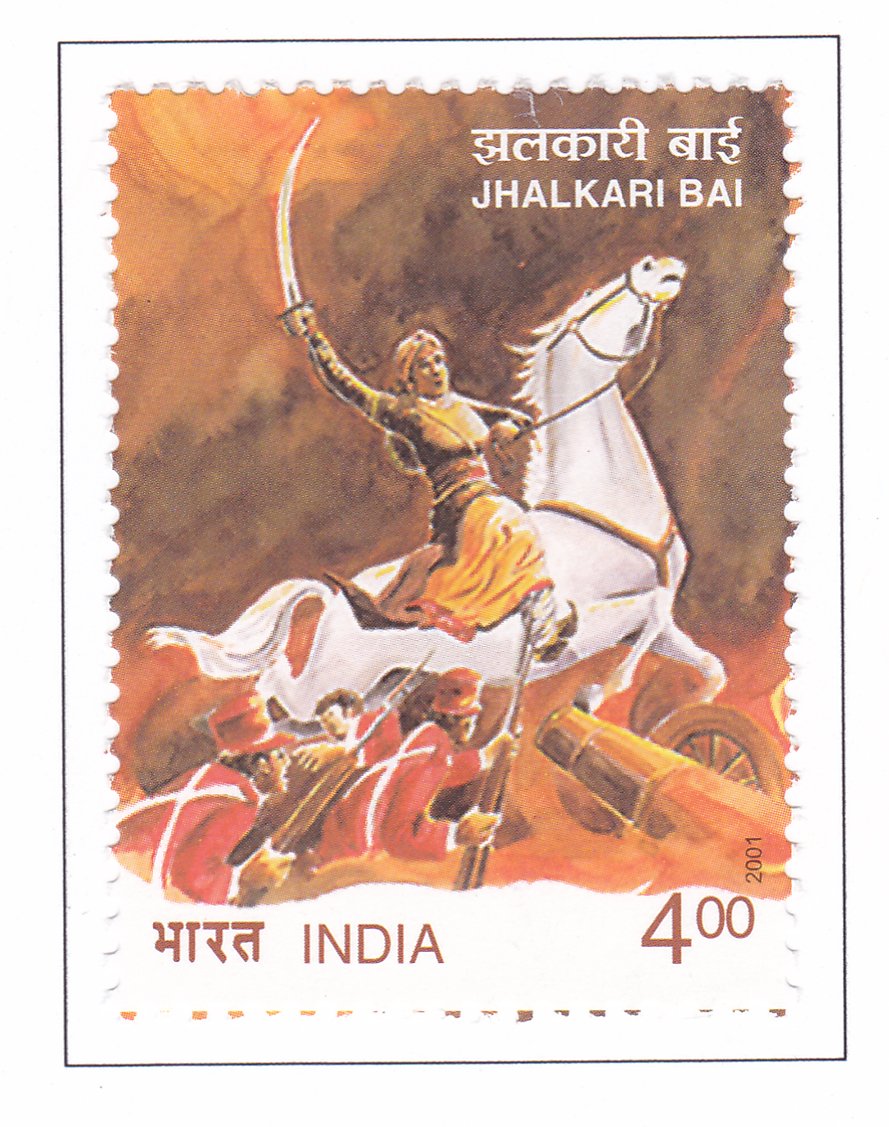Jhalkari Bai (1830-1857)

Technical Data
| Date of Issue | July 22, 2001 |
|---|---|
| Denomination | Rs. 4 |
| Quantity | 400,000 |
| Perforation | comb 13 |
| Printer | Eagle Press Ltd. |
| Watermark | No Watermark |
| Colors | Multicolor |
| Catalog Codes |
Michel IN 1841 Stamp Number IN 1900 Yvert et Tellier IN 1607 Stanley Gibbons IN 2007 |
| Themes | Animals (Fauna) | Commemoration | Equestrianism and horse riding | Famous people | Horses | Mammals | Women |
Table of Contents
Jhalkari Bai (1830-1857)
Jhalkari Bai (1830–1857) was a courageous warrior and a key figure in the Indian Rebellion of 1857. Hailing from the Koli community, Jhalkari Bai is best remembered for her unwavering loyalty and bravery as a prominent soldier in the army of Rani Lakshmibai of Jhansi, one of the most famous leaders of the 1857 revolt against British rule.
Early Life and Background
- Jhalkari Bai was born in 1830 in the village of Bhojla near Jhansi in what is now Uttar Pradesh. She belonged to a humble Koli family, and from an early age, she exhibited exceptional strength and bravery.
- Raised in a rural environment, she learned to ride horses and use weapons, skills uncommon for women at the time, which prepared her for the pivotal role she would play in the fight for India’s independence.
- Her physical resemblance to Rani Lakshmibai would later play a crucial role in confusing the British forces during the battle for Jhansi.
Role in the Indian Rebellion of 1857
- Jhalkari Bai was introduced to Rani Lakshmibai by her husband, Puran Singh, who was a soldier in the queen’s army. Impressed by her bravery and skills in combat, Rani Lakshmibai appointed her to lead the Durga Dal, the women’s wing of the army.
- Jhalkari Bai quickly became one of the Rani’s closest confidantes, not just because of her military prowess, but also due to her fierce loyalty.
- During the Siege of Jhansi in 1857, when the British forces attacked the fort of Jhansi, Jhalkari Bai played a crucial role. As the British closed in, Jhalkari Bai, dressed in the queen’s armor, disguised herself as Rani Lakshmibai to divert the British forces and buy time for the queen to escape.
- This act of deception confused the British soldiers, allowing Rani Lakshmibai and her forces to regroup, though Jhansi ultimately fell to the British. Jhalkari Bai’s self-sacrifice showcased her immense bravery and dedication to the cause of freedom.
Legacy
- Jhalkari Bai’s heroism remains an inspiring symbol of courage and patriotism, especially for marginalized communities in India. Her story was relatively lesser-known compared to other freedom fighters, but in recent years, her contributions have gained more recognition.
- She is regarded as a symbol of women’s empowerment and is celebrated, particularly in Bundelkhand, where she is revered for her role in the 1857 revolt.
- Many memorials, statues, and public events are held in her honor, and her legacy is remembered in various folk songs and stories that highlight her bravery and dedication.
The Department of Posts in India has also issued commemorative stamps in her honor, recognizing her valiant contributions to India’s first war of independence. Jhalkari Bai stands as a symbol of courage, resilience, and the crucial role women played in the struggle for India’s freedom.
